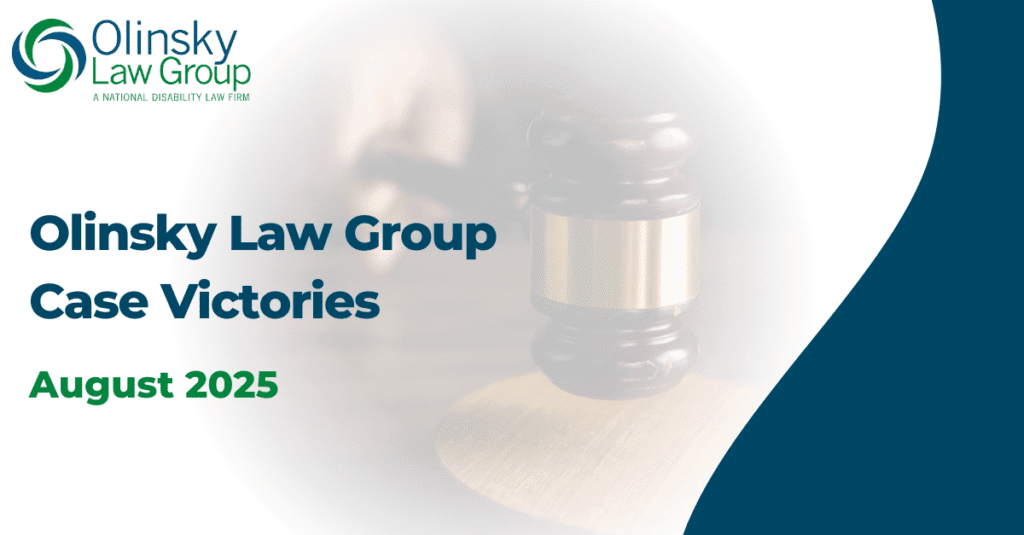Case Victories – August 2025

We’re frequently asked how we win remands on the many cases that get referred to us. We have found that almost all ALJ decisions have errors in them. It’s pointing out those errors to OGC and the Court which procures the remand.
We are presently finding that the ALJs are not following the new regulations on supportability and consistency. If your client’s decision did not sufficiently analyze both the supportability and consistency of all the medical opinions, we want to review that case for federal court.
We’re excited to share some of our recent case victories with you. Here you can read details directly from our attorneys.
Winnie v. SSA (1:25-cv-1177-HJR) | Southern District of New York
The Commissioner stipulated to the need for remand in a case where the ALJ failed to analyze the claimant’s migraine disorder in accordance with SSRs 16-3p and 19-4p. The ALJ’s unexplained disregard for the claimant’s migraines was particularly problematic given that the ALJ had found state agency consultants’ opinions persuasive – opinions which explicitly determined that migraines were both medically determinable and severe. The decision was void of any explanation as to how the ALJ reconciled his step 2 finding with his evaluation of these opinions, nor how any evidence purportedly undermined Plaintiff’s allegations about the detrimental impact of her migraines on daily functioning. The Southern District of New York granted the parties’ joint motion for remand.
Gageby v. SSA (cv-24-2595) | District of Montana
In this case, the Federal District Court had previously remanded the case for a new hearing and decision. However, in the ALJ’s new decision from that hearing, the ALJ had downgraded Plaintiff’s limitations in concentration, persistence, and pace from “moderate” in his first decision to “mild” limitations in the second decision without providing any explanation for the downgrade. The Court found “ALJs must explain their decisions, including changes in findings.” Id. at *1. The Court found the error to be harmful because moderate limitations in concentration, persistence, and pace may impact her ability to complete a normal workday and workweek and would impact the evaluation of a treating physician’s opinion concerning her concentration, persistence, and pace limitations. Remand was found appropriate for further proceedings.
Short v. SSA (4:24-cv-1956-MCC) | Middle District of Pennsylvania
The case was briefed in Federal Court in June of 2025 by our team, arguing as follows:
- The ALJ erred by finding that Claimant had no more than mild limitations in the functional area of adapting or managing oneself.
- The ALJ violated 20 C.F.R. §§ 404.1529, 416.929 and SSR 16-3p, by failing to provide reasons for rejecting the testimony of Heather Short, Claimant’s sister.
- To the extent that the record shows that Claimant’s mental restrictions are attributable in part to alcoholism, the decision here fails to comply with 20 C.F.R. §§ 404.1535, 416.935 and SSR 13-2p.
- The ALJ erred by failing to obtain medical expert testimony, since the State agency psychologists found insufficient information to determine a mental RFC, and there were no medical opinions quantifying the mental restrictions, leaving the ALJ to rely on his own lay interpretation of the records in finding that evidence submitted at the hearing level made the record sufficient.
The U.S. Attorney proposed to voluntarily remand the case for another ALJ hearing, and we agreed. On July 14, 2025, U.S. Magistrate Judge Martin C. Carlson, granted the uncontested motion of the parties and remanded the case under sentence four of 42 U.S.C. § 405(g), 1383(c)(3), for a new hearing and a new decision.
Billings v. SSA (4:21-cv-629) | Eastern District of Arkansas
The District Court for the Eastern District of Arkansas reversed and remanded an Unfavorable Decision for failure to develop the record. In this case, the ALJ had found the claimant incapable of performing her past relevant work, in accordance with the vocational expert’s testimony, but the Appeals Council had affirmed the denial based on an inexplicable finding that the claimant could return to her past relevant work. The Court concluded that whether it was the ALJ or the AC that failed the claimant, the failure was evident. The Court explained that the requirements of Plaintiff’s past relevant work, and her capacity to perform it, remained open questions which the administration erred in failing to resolve. As result, the Unfavorable Decision was legally erroneous and unsupported, warranting remand.
 Contact Us: 1-888-WIN-SSDISM
Contact Us: 1-888-WIN-SSDISM  info@windisability.com
info@windisability.com